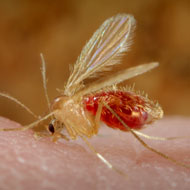
New research identifies therapeutic targets for tropical disease
US scientists say they have uncovered promising new targets for the treatment of leishmaniasis, which affects around two million people a year.
New research published in the journal PLOS Pathogens suggests that drugs already approved for other conditions could also help to treat this parasitic disease, which is transmitted through the bite of a sand fly.
Leishmaniasis results in skin ulcers that can take months or years to heal and, in rare cases, can become metastatic, leading to major tissue damage. Whilst anti-parasitic drugs can aid healing, for some patients, ulcers persist even when the parasite is almost undetectable in the body.
Senior researcher Phillip Scott, from the University of Pennsylvania School of Veterinary Medicine, believes the skin damage is less to do with the direct effects of the Leishmania parasite, and more to do with an immune response gone wrong.
According to the research team, the immune system’s T cells trigger the activation of a signalling pathway leading to chronic inflammation. Blocking either of two major players in this pathway can result in significant reduction in lesions, their animal model suggests.
Researchers suspected the IL-1b gene, which is associated with inflammation in other conditions, could be linked to tissue damage in leishmania-infected people. They found higher levels of IL-1b in infected mice that had been bred to lack mature T cells and had CD8 T cells added back in, compared to mice with no T cells.
The mice with CD8 T cells added were treated with an IL-1b inhibitor, which researchers say greatly reduced the severity of disease. A drug called anakinra, which blocks the IL-1 receptor, is already FDA-approved for the treatment rheumatoid arthritis. Researchers say this also reduced the skin pathology in mice.
In addition, two drugs that inhibit the NLRP3 inflammasome, which is involved in IL-1 production, were found to prevent mice from developing severe disease. One of these, glyburide, is an approved diabetes drug.
To assess the relevance of their findings in humans, researchers then turned to skin biopsies from leishmaniasis patients. They found lesion biopsies in culture produced more IL-1b than normal skin cells. Treating the lesion biopsy with glyburide also significantly decreased the amount of IL-1b the cultured cells released.
Lead author Fernanda O Novais said: “What we found was that drugs blocking either the inflammasome or IL-1b have the same effect in controlling disease”.
Professor Scott added: “At this point, we have solid evidence in the mouse that blocking these pathways with a couple of different drugs blocks the pathology, and we have data from patients that this pathway is operating in humans. What we don’t have is information on whether blocking these pathways will clear up pathology in patients.”
Researchers hope to be involved in clinical trials of current drugs on the market, such as anakinra, glyburide, or a humanised inhibitor of IL-1b.
Image by



 The Veterinary Medicines Directorate (VMD) is inviting applications from veterinary students to attend a one-week extramural studies (EMS) placement in July 2026.
The Veterinary Medicines Directorate (VMD) is inviting applications from veterinary students to attend a one-week extramural studies (EMS) placement in July 2026.